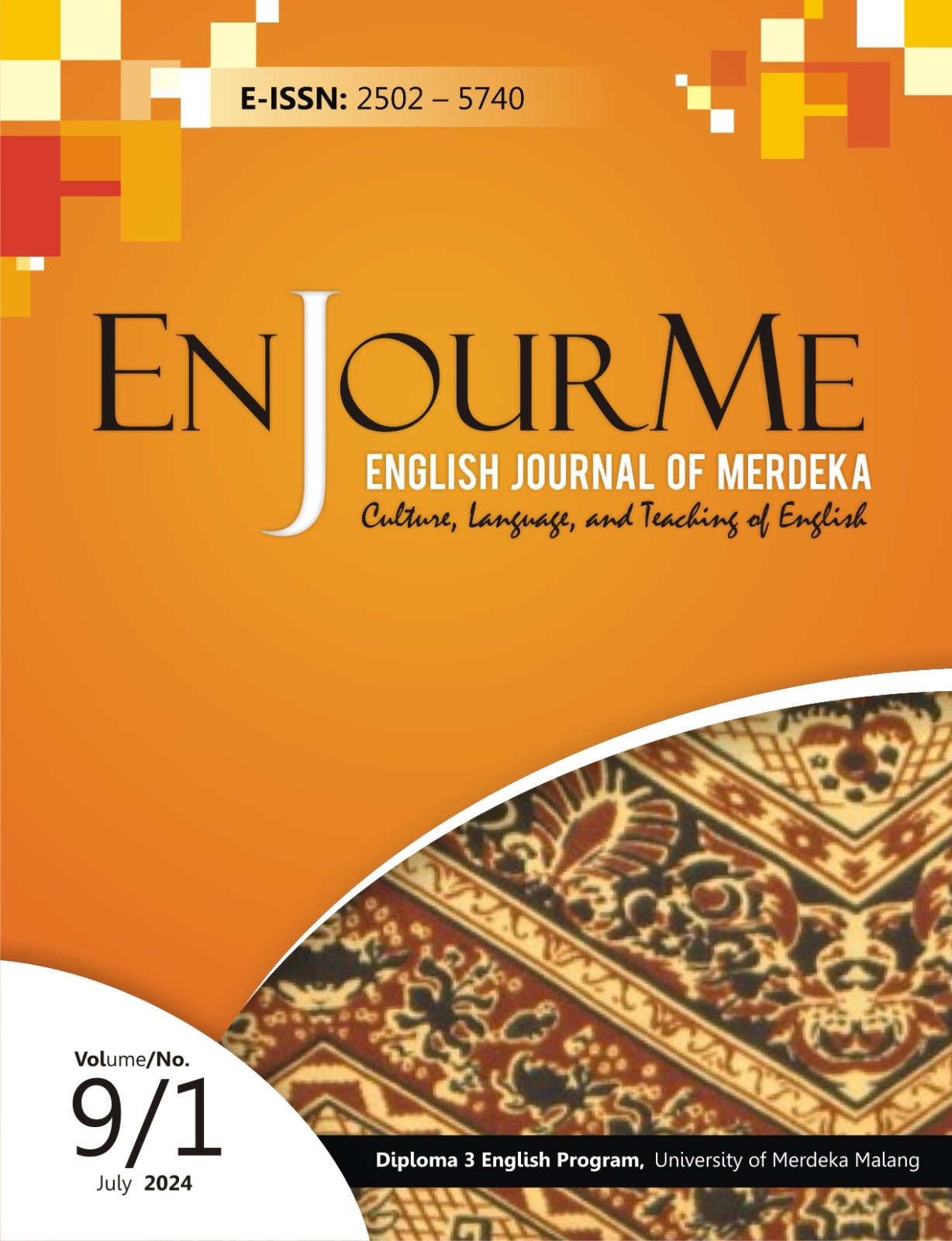Voices from Margin: Theoretical Insights into Kaiser Haq's Ode on the Lungi
DOI:
https://doi.org/10.26905/enjourme.v9i1.12290Keywords:
Marginality, Neo- imperialism, Subaltern voices, Sartorial equality, Postcolonial identityAbstract
This article investigates into Kaiser Haq’s poetic masterpiece, “Ode on the Lungiâ€, exploring its theoretical underpinnings and critical insights. The study employs a multidimensional approach, integrating postcolonial theories, literary analysis, and socio-cultural inquiry to unravel the symbolic significance of the lungi as a representation of subaltern voices. Haq strategically uses the lungi to challenge power imbalances, resist sartorial hegemony, and advocate for sartorial equality in the face of globalization. The research method includes qualitative analysis, theoretical engagement, and empirical evidence, aligning with postcolonial scholars such as Gramsci and Guha. The article underscores the poem’s role in breaking down divisive dichotomies and promoting democratic ideals. Through theoretical insights and close textual analysis, the study explores how the lungi, as a symbol of the underclass, resists aggressive modernism, demanding equal standing in the postcolonial and globalized reality. The poet’s call for “sartorial equality†transcends fashion, becoming a rallying cry for broader societal equality and recognition of marginalized voices. The research concludes by positioning Haq’s “Ode on the Lungi†as a powerful articulation of the subaltern voice within the complexities of postcolonial discourse.
Downloads
References
Ahmed, T. (2018). Kaiser Haq: Emerging transnational poet of Bangladesh. Asiatic: IIUM Journal of English Language and Literature, 12(1), 126–143. https://doi.org/10.31436/asiatic.v12i1.1213
Baidya, T. K. (2020, August 5). A Bengali poet in English: Reading Kaiser Haq’s poetry from a postcolonial perspective. Medium. https://medium.com/enhcbd/a-bengali-poet-in-english-reading-kaiser-haqs-poetry-from-a-postcolonial-perspective-95fc22
Biswas, P. C., & Azad, A. (2024). Undermining cultural hegemony and sartorial identity in “Ode on the Lungiâ€: A psychological exploration. International Journal of Diverse Discourses (IJDD), 1(1), 23-30. https://doi.org/10.5281/zenodo.10436377
Chisty, S. H. (2021). Ode on the lungi: A resistance to the politics of socio-semiotic violence. Erothanatos: A Peer-Reviewed Quarterly Journal on Literature, 5(2), 19-31. https://www.erothanatos.com/vol5issue2
Choudhury, K. A. (2013). Subaltern Speaks: A Theoretical Analysis of Kaiser Haq’s Ode on the Lungi. Journal of Higher Education and Research Society, 1(1), 61-66. https://herso.org/issue-1-vol-1-oct-2013/
Guha, R. (1988). Selected Subaltern Studies: On Some Aspects of the Historiography of Colonial India (1st ed.). Oxford University Press.
Gramsci, A. (2004). “Hegemonyâ€. Literary Theory: An Anthology. Ed. J. Revkin, and M. Ryan. (2nd ed., p. 673), Blackwell Publishing.
Haq, K. (2008). Ode on the Lungi. Asiatic: IIUM Journal of English Language and Literature, 2(2), 149-144. https://doi.org/10.31436/asiatic.v2i2.58
Haq, K. (2012). Published in the Streets of Dhaka: Collected poems with new including “Ode on the Lungi†and other new poems (1st ed.). University Press Limited.
Haq, K. (2013, April 18). Come flap your lungis! All garments deserve equality! Dhaka Tribune. https://www.dhakatribune.com/opinion/op-ed/25051/come-flap-your-lungis-all-garments-deserve
Hossain, M. S. (2013). Haq’s Ode on the Lungi: An Allegorical Quest for Sartorial Equality. Harvest, 28, 1-19.
Islam, M. F., Chandraaroy, B., & Rifat-Ur-Rahman, M. (2023). Hegemonic cultural attitude towards ‘lungi’ in deconstructing ‘Bangali identity’: Postcolonial perspectives. Journal of Nazrul University, 9(1&2), 173-184.
Mambrol, N. (2016, April 8). Subaltern (Postcolonialism). Literary Theory and Criticism. https://literariness.org/2016/04/08/subaltern-postcolonialism/
Mithun, L. C. (2024, August 27). An apology for lungi: Kaiserian way. The Daily Asian Age. https://dailyasianage.com/news/292394/an-apology-for-lungi-kaiserian-way
Said, E. (2006). “Orientalism.†The Post-colonial Studies Reader. Ed. B. Ashcroft, G. Gareth and T. Helen. (2nd ed., pp. 24-27), Routledge.
Ullah, S. (2018). ‘Ode on the lungi’: Kaiser Haq’s portrayal of ‘the subaltern speaking’. Erothanatos: A Peer-Reviewed Quarterly Journal on Literature, 2(4), 77-87. https://www.erothanatos.com/v2i4n7
Additional Files
Published
How to Cite
Issue
Section
License
Authors who publish with this journal agree to the following terms:
(1) Copyright of the published articles will be transferred to the journal as the publisher of the manuscripts. Therefore, the author confirms that the copyright has been managed by the journal.
(2) Publisher of EnJourMe (English Journal of Merdeka) : Culture, Language, and Teaching of English is University of Merdeka Malang.
(3) The copyright follows Creative Commons Attribution–ShareAlike License (CC BY SA): This license allows to Share — copy and redistribute the material in any medium or format, Adapt — remix, transform, and build upon the material, for any purpose, even commercially.




